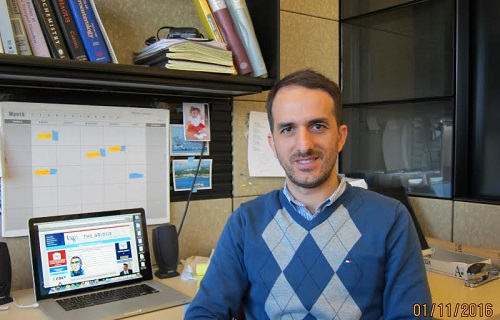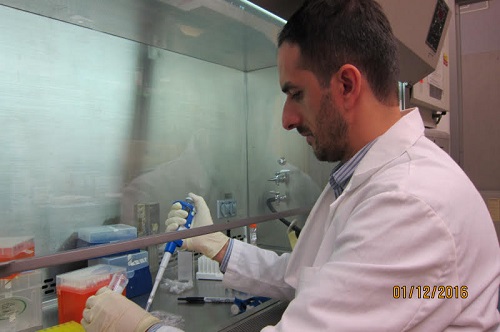Young Scholar Profile: Nevzat Kazgan

In every issue of The Bridge, we highlight a young scholar profile from our diaspora. These accomplished and early career individuals demonstrate the potential of next generation Turkish-American scientists and scholars. The young scholar in this issue is Nevzat Kazgan, a postdoctoral fellow at the Center for Gastrointestinal Biology and Disease, at University of North Carolina, Chapel Hill.
The Bridge: Would you please tell us about yourself and your journey that led you to become a scientist.
Nevzat Kazgan: I was always interested in science classes during my middle and high school years. Additionally, attending a science high school and with a very enthusiastic Biology teacher led me to prepare for the National Biology Olympiads. This experience, and the friends I made there, induced a lifelong fascination with biology. Consequently, I selected the newly established Molecular Biology and Genetics department as my major/department in Bogazici University, Istanbul. This decision was the start of my journey to become a scientist. Then, I chose similar path with my fellow classmates by coming to US for my graduate study. Initially, I attended Columbia University in New York as a summer research intern. Subsequently, I returned to Columbia University for another research opportunity and then my principal investigator (PI) asked me if I wanted to join his lab as a research assistant. That is how I started my academic journey in the US and after two years of research in that lab, I joined the University of North Carolina at Chapel Hill for my graduate-PhD- program.
T. B. : Tell us about your research and how it is related to everyday life or other fields.
N.K. : During my graduate studies, I studied a protein called AMP-activated protein kinase (AMPK). We found a novel nuclear export code in the DNA coding for this protein that helps this protein to transport in and out of cell nucleus. This was important because AMPK is the main target protein of Metformin, most prescribed drug for Type 2 Diabetes in every country out there. After graduating from my PhD, during my postdoctoral studies, I studied a protein called Sirtuin 1 (also known as “anti-aging gene”; the primary target of a compound called resveratrol) and its role in intestinal metabolism. I demonstrated the importance of Sirtuin 1 protein in systemic cholesterol and bile acid homeostasis using mice as a model system. As we all know, high cholesterol levels in circulation can lead to many diseases in humans including cardiovascular diseases. Regulating cholesterol and the bile acid balance in the body is very essential for protection from cardiovascular diseases and we showed that Sirtuins do have a role in that.
Currently, I am working on Inflammatory Bowel Diseases, mainly Crohn’s Disease. Crohn’s disease can be a very severe disease that causes inflammation of the lining of the digestive tract, mainly small intestine and colon. Currently, roughly 1.4 million patients in USA and 125 people out of every 100,000 people in Turkey have Inflammatory Bowel Diseases. Our lab studies diagnostic markers of Crohn’s disease with the aim of finding gene targets that can tell us how the disease will progress for individual patients. This help doctors to decide what kind of treatments will best serve their patients. We are mainly interested in microRNAs, small non-coding RNAs that can attach to other genes’ RNAs and silence their function. We have already identified some novel microRNAs whose expression can tell us how severe is the patient’s disease will progress in the coming months and years.
T. B. : What do you consider important to your success? Tell us about any skills or habits that you think helped you to become a successful scientist at such a young age.
N.K. : First, I don't consider myself successful enough J. I think success, in any scientific field, in its general meaning requires a couple of qualities in oneself. Firstly, I believe persistence is important, the ability to not give up easily in the face of adversity. Patience is another quality that everybody should have to become successful in life. Being patient towards classes/exams, or finishing a project is important. Also, staying positive when an experiment or project does not work the way you hypothesized is also very important. I also try to read comprehensively about my research topic and any other related/non-related topics whenever I get stuck in an experiment. Turning to literature about my research brings many new ideas to my mind. Teamwork and having good human relations is also a must to be successful in today’s life since we are all working on complex projects and working as a team always makes thing go easier and faster. Last but not least, another good quality to have would be time management. With the ability to successfully manage one’s time and work efficiently, one can achieve success in almost any scientific field.
T. B. : What are your immediate and long-term goals for the future?
N.K. : My immediate goal is to become an expert in my current research topic: studying inflammatory bowel diseases. My future long-term goal is to become a faculty member here in the States or in Turkey, raise smart, critically thinking students and do ground-breaking research.
T. B. : What do you recommend to aspiring scientists, or to young Turkish scientists who are at the beginning of their careers?
N.K. : Well, scientific research is ever-growing and there have been major developments in every area of scientific research in the last decade. For instance, in Biological Sciences, after sequencing the DNA code of human genome, the speed of studying the function of genes has increased dramatically. This also led to innovations of high throughput sequencing, a sequencing method where one can sequence entire genome of a cell/tissue in a matter of days. This was not possible and easy before. This is really a powerful tool because it gives researchers a very clear view of what is going on in the cellular DNA and chromatin in any given time and condition. These are all very exciting developments. There are many other developments in such as microscopy, gene targeting (knockdown) and etc. but we do not have enough space to go through all of them here.
Science will continue to be interesting and exciting but at the same there is another point that I would like to make. Especially with biological sciences, research builds up slowly and as a researcher one has to be patient. Also, being a good researcher requires hard-work and dedication. In addition, one needs to focus the bigger picture of your project all the time. Getting lost in small details can sometimes distract you from your overall goal, as well as making funding harder to acquire. Finally, research and science means you need to be a good presenter/talker since you need to present your data and ideas in front of people all the time.
T. B. : Could you please tell us about your life outside of your work? Do you have hobbies? What are your favorite activities? Would you like to recommend some books?
N.K. : As a scientist, it is almost like everywhere is work for me. Even if I leave the lab, the work follows me home since there is always a deadline of some sort. Apart from that, I have a family and so most of my activities involve my kids. I really enjoy spending time with them. I also like fixing some household items, playing soccer and watching historical movies. I have always been interested in the history of people, nations and countries, both Turkish and world. It has been a while since I finished a book, but there are many books in my list to read these days.
